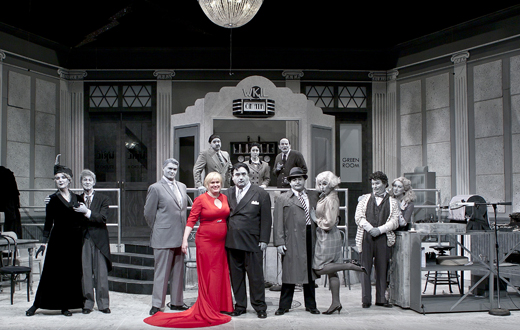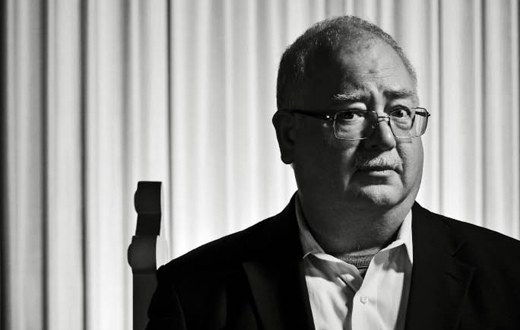A comic play brings 1940s noir to life

This color photograph was taken during last year’s “Living Black and White” production, “The Frequence of Death!” Photo by Mark Oristano
It’s 1942 and the United States just entered World War II. Onstage a murder occurs, doors are welded shut, a séance takes place and Nazi spies make guest appearances. The world is black and white — literally. Not a speck of color dots the stage until the very end when producer Barbara Weinberger, wife of play creator Kurt Kleinmann, steps onto the stage draped in a bright red dress.
These scenes are part of Pegasus Theatre’s annual “Living Black and White” productions. Running Dec. 31-Jan. 20, “XSR: Die!” (or cross stage right and die), features the bumbling main character Harry Hunsacker in a backstage Broadway theater murder mystery.
Unlike other period plays, Pegasus Theatre imagines the bygone days as seen in classic films. Black, white and gray makeup, costumes and props whisk audience members to a place where good and evil are clearly defined, the guy always gets the girl and detectives always find the criminal.
Actors painstakingly apply makeup to their faces, hands and any visible strips of skin to hide fleshy colors.
“Nobody had ever done it before,” says Kleinmann, an East Dallas resident and founder of Pegasus Theatre, about first creating the illusion of a black-and-white film come to life. Kleinmann wrote the series of Harry Hunsacker plays and personally came up with a secret and sought-after method of creating the illusion, which includes makeup composition and application, lighting and other factors.
Harry isn’t your suave, spitfire-dialogue detective of 1930s and ’40s-era films. Kleinmann and others describe him as inept, endearing, loyal, good-hearted and childlike without being childish.
“Harry has a very simple way of viewing things that I find charming,” Kleinmann says.
Kleinmann began writing the “Living Black and White” spoofs in 1978. A total of 16 plays have been produced, each of them starring Kleinmann as Harry.
Immersing himself in movies of the era is essential to writing, Kleinmann says.
“I pay attention to conventions of the period, like [there’s] no blood, no overt sex, no cursing, patriotism, wholesomeness,” Kleinmann says. “The real world is much more nuanced than films of that period. In ’30s films, a bad cop is a bad cop. In the real world, a cop maybe has bad traits.”
The Harry Hunsacker plays have attracted a cult-like following. Michael Serrecchia saw one of the performances in the 1980s and is now directing “XSR: Die!”
“It was kind of miraculous. It’s a movie that comes alive,” he says.
Beyond makeup, lighting and costumes, Serrecchia tries to reflect the time period in things like pacing, body language and line delivery.
“My TV has been on TCM [Turner Classic Movies] for the last two months cramming,” Serrecchia said in a September interview. “There’s a lot of history here that I don’t want to trample on.”
The plays are loosely inspired by Sherlock Holmes stories. Unlike the famous fictional detective, Harry may not be sharp but he is well meaning and “just trying to do the right thing the whole time,” according to Serrecchia.
“We deal with a world of absolutes,” Kleinmann says of the plays. “I think there’s a longing for that sort of world. The more cluttered and chaotic our world becomes … when things get overwhelmed, people seek a simplicity, an order to their lives. They want something that just makes sense.”
Children are among Harry’s biggest fans though they never lived in the ’40s and more likely watch “Toy Story” than “The Big Sleep.”
“They get it. It speaks to something they would like to have in their lives, too: the simplicity to understand what’s going on,” Kleinmann says. In a world of “moral compromise,” he says, “it’s comforting to look at a world where things are, no pun intended, black and white.”
“XSR: Die!” runs Dec. 31-Jan. 20 at the Eisemann Center for Performing Arts. Tickets cost $10-$50 and can be purchased at 972.744.4650 or eisemanncenter.com.






